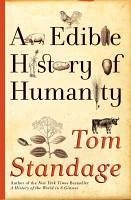Throughout history, food has done more than simply provide sustenance. It has acted as a tool of social transformation, political organization, geopolitical competition, industrial development, military conflict and economic expansion. An Edible History of Humanity is an account of how food has helped to shape and transform societies around the world, from the emergence of farming in China by 7,500 BCE to today's use of sugar cane and corn to make ethanol.
Food has been a kind of technology, a tool that has changed the course of human progress. It helped to found, structure, and connect together civilizations worldwide, and to build empires and bring about a surge in economic development through industrialization. Food has been employed as a military and ideological weapon. And today, in the culmination of a process that has been going on for thousands of years, the foods we choose in the supermarket connect us to global debates about trade, development and the adoption of new technologies.
Drawing from many fields including genetics, archaeology, anthropology, ethno-botany and economics, the story of these food-driven transformations is a fully satisfying account of the whole of human history.
Dieser Download kann aus rechtlichen Gründen nur mit Rechnungsadresse in A, B, BG, CY, CZ, D, DK, EW, E, FIN, F, GR, HR, H, I, LT, L, LR, M, PL, P, R, S, SLO, SK ausgeliefert werden.









